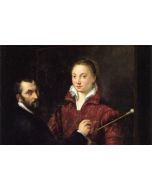Lunchtime lecture: Reading Old Master Drawings - an art historical insight
This course will be delivered online. See the ‘What is the course about?’ section in course details for more information.
- Course Code: VB787
- Dates: 22/05/24 - 22/05/24
- Time: 13:00 - 14:00
- Taught: Wed, Daytime
- Duration: 1 session
- Location: Online
- Tutor: Sarah Jaffray
Course Code: VB787
Duration: 1 session
Please note: We offer a wide variety of financial support to make courses affordable. Just visit our online Help Centre for more information on a range of topics including fees, online learning and FAQs.
What is the course about?
Drawing is a distinct art form; different from painting and sculpture, other ‘old master’ practices, drawing gives us a different insight to the artist’s process. This lecture will explore what makes drawing different to other art materials by looking a technical aspects related to ‘Old Master’ drawings. From paper to chalk, graphite to ink we’ll explore how these materials work with and for the artist’s working method.
We will look at a wide range of drawings from Western Europe falling between the years between 1400 and 1850, a period often associated with the term ‘Old Master’. We do this to understand the value of studying drawing in the history of art.
A disclaimer: this lecture is not about identifying/valuing historic drawings for auction or sale. Instead, it is about better understanding drawing as an art medium in the history of Western art.
This is a live online course. You will need:
- Internet connection. The classes work best with Chrome.
- A computer with microphone and camera is best (e.g. a PC/laptop/iMac/MacBook), or a tablet/iPad/smart phone/iPhone if you don't have a computer.
- Earphones/headphones/speakers.
We will contact you with joining instructions before your course starts.
What will we cover?
• Technical aspects of drawing, including terminology
• Purposes of drawing in the early modern period in Europe
• The value of studying drawing alongside other art forms in the history of Western art.
What will I achieve?
By the end of this course you should be able to...
• Discuss at least one technical aspect of drawing discussed in the lecture
• Understand why drawing is a distinct medium
• Describe at least one of the major reasons why artists used drawing in early modern Europe.
What level is the course and do I need any particular skills?
This course is open to all.
You should be able to operate basic elements of Zoom, e.g. microphone, camera and log in.
How will I be taught, and will there be any work outside the class?
You will be taught with lecture and powerpoint slides. There will be an opportunity to ask questions at the end of the lecture session.
Are there any other costs? Is there anything I need to bring?
No extra costs, but you may wish to bring a notebook to take notes.
When I've finished, what course can I do next?
Search for 'lunchtime lectures' to see all of the talks on offer in the coming year.
Sarah Jaffray holds a BA and MA in Art History with an emphasis in 19th/20th century France and a minor in the Italian Renaissance. She holds a second MA in Cultural Theory from Goldsmiths, University of London. Sarah was a lecturer for several colleges and universities in the Los Angeles area before relocating to London in 2012. She has worked in curatorial roles at the British Museum and Wellcome Collection. In addition to her current teaching at City Lit, Sarah is a lecturer at the University of Arts London and the Tutor Coordinator for City Lit's Art History programme. Her art historical practice focuses on experimental narratives, artistic process, art pedagogy, politics and philosophy. Sarah's current research is focused on translation and empathy.
Please note: We reserve the right to change our tutors from those advertised. This happens rarely, but if it does, we are unable to refund fees due to this. Our tutors may have different teaching styles; however we guarantee a consistent quality of teaching in all our courses.
